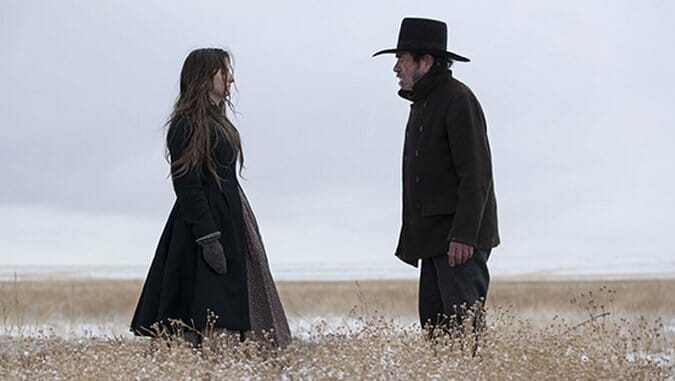The Homesman

For an actor known for his stoic performances and gruff persona, Tommy Lee Jones reveals another side of himself when he steps behind the camera. His 2005 directorial debut, The Three Burials of Melquiades Estrada, was ostensibly a Western, but it had flashes of bizarre surrealism and dark humor that were magnificently balanced. He hasn’t directed a film since, which raises expectations that The Homesman can’t quite satisfy. And yet, his sophomore effort is resolutely strange in its own ways. Though tonally inconsistent, The Homesman is one curious, ornery creature.
The film stars Hilary Swank as Mary Bee Cuddy, a solitary woman living in the rugged Nebraska Territory in the 19th century. Viewed as plain-looking and old—she’s in her 30s and unmarried, after all—Cuddy volunteers for the unenviable assignment of transporting East three local woman, diagnosed as having gone mad, in the hopes of getting them more suitable medical care. Going it alone, she stumbles upon George Briggs (Jones), who has his neck in a noose that’s tied to a tree; if the horse he’s sitting on takes off, he’s a dead man. Cuddy frees the coarse coot on the condition that he assist in the transport of these sick women. He agrees, but neither she nor we know for sure if he can be trusted.
If Three Burials provided Jones with one of his best recent roles—a variation on his rugged-quiet-man aesthetic but with room for deep soulfulness—The Homesman is disappointingly straightforward. Almost swallowed up by the character’s folksy clichés (Briggs never bellows “Tarnation!” or “Yeehawww!” but he might as well have) Jones plays him a little too close to a live-action Yosemite Sam. Of course, as we eventually realize, that’s a bit of a feint: Slowly, stubbornly, Briggs is on a journey not just to aid Cuddy, but to aid himself, to find some sort of purpose for his lying, cheating nature.
-

-

-

-

-

-

-

-

-

-

-

-

-

-

-

-

-

-

-

-

-

-

-

-

-

-

-

-

-

-

-

-

-

-

-

-

-

-

-

-








































